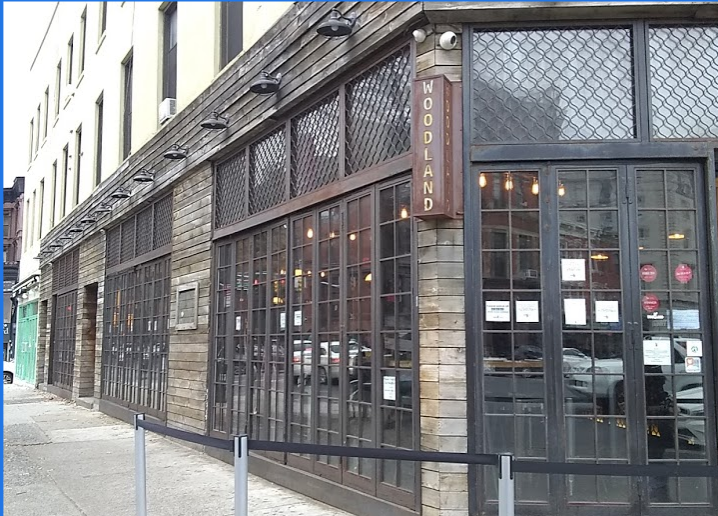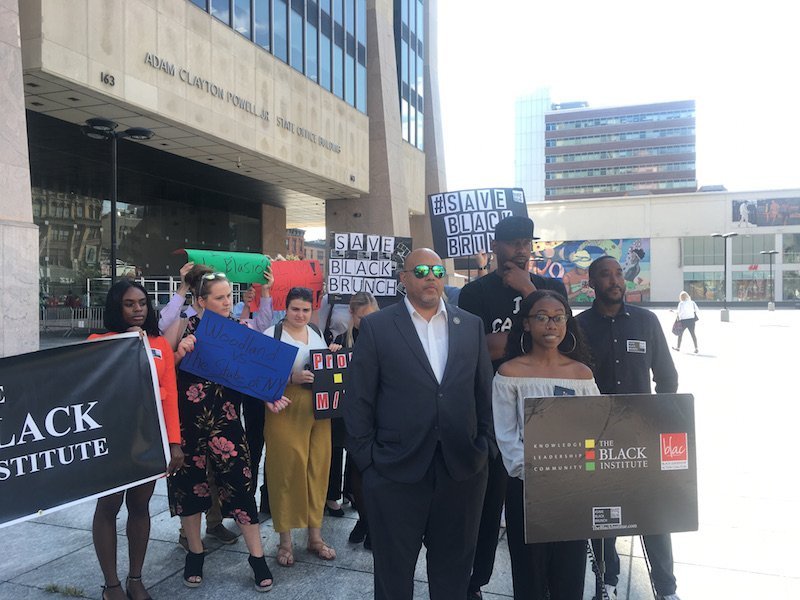As black activists protested on the street in the heart of Harlem on Wednesday, the fate of Woodland Restaurant’s liquor license was being debated upstairs in the Adam Clayton Powell Jr. State Office Building, 163 West 125th Street.
And when the dust had cleared, the State Liquor Authority (SLA) heard the prosecutors side of the story of why the eatery should have their license revoked, but put off a final decision until they hear Woodland and its’ defenders side of the story on Aug. 20.
The fate of Woodland, 242 Flatbush Avenue and the corner of 6th Avenue on the northeastern end of Park Slope has become racially charged.
On one side, progressive City Council Member Brad Lander (D-Park Slope, Windsor Terrace, Kensington) and Assemblywoman Jo Anne Simon (D-Carroll Gardens, Cobble Hill, Boerum Hill), along with the local community board say Woodland is noisy and out of control with drunken and disorderly patrons wandering the neighborhood, urinating, having sex and vomiting.
With the electeds leading the way, the local police precinct, and government agencies have continually visited Woodland and issued a number of violations including several questionable violations such as allegedly mistaking candles on birthday cakes for fireworks.

Woodland’s white owner, Akiva Ofshtein, and many of its patrons say the complaints stem from the fact that the majority of the clientele are young black and brown millennials.
To this end, black and brown advocates have collected over 3,000 petition signatures for Woodland to keep their license.
Also to this end, the Black Institute, a nonprofit organization advocating for Woodland, and whose mission is to shape intellectual discourse and impacts public policy uniquely from a black and people of color perspective, recently completed a study dubbed: Caberet Law 2.0: Same Old Song & Dance, which looked at the history of discrimination against black clubs in the city, and how things have not changed.
The white paper also completed a citywide study of coordinated raids known as Multi-Agency Response to Community Hotspots (MARCH) operations on nightlife spots and found that a majority of these raids come at clubs in largely neighborhoods of color.
“The SLA, NYPD, and the City of New York are using extreme enforcement actions to close down black and brown restaurants, but we’re fighting back. The accusations being made against Woodland are blown out of proportion and are just another example of racial targeting by the city and state. The methods being used to persecute these businesses are the Cabaret Law 2.0 and violations being lobbed are the old law in new packaging with agencies like the SLA using the police as a weapon. If the city won’t put an end to it, we will,” said Bertha Lewis, Founder and President of The Black Institute.
At Wednesday’s hearing, supporters of Woodland were also dismayed they were not allowed into the hearing room to listen in on the proceedings.
Black Institute Community Organizer Dan Hogle alleged the SLA continued to lay out a false narrative about Woodland.
Woodland still has not had an opportunity to refute the allegations made by the SLA, or those statements that continue to be made by Council Member Lander and Assembly Member Simon. During the three hearing days thus far, there has been no evidence to support the accusations of drunk driving, trespassing or vandalism. We’ve even heard testimony from the 78th Precinct that there has not been a noise issue in over a month, disproving the assertion that the establishment has made no effort to address community concerns,” said Hogle.
“Moving forward, we hope that these frivolous and unfounded accusations stop and we look forward to hearing from supporters to set the record straight,” he added.






